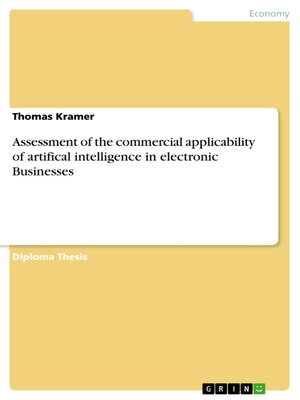Assessment of the commercial applicability of artifical intelligence in electronic Businesses
ebook
By Thomas Kramer

Sign up to save your library
With an OverDrive account, you can save your favorite libraries for at-a-glance information about availability. Find out more about OverDrive accounts.
Find this title in Libby, the library reading app by OverDrive.



Search for a digital library with this title
Title found at these libraries:
| Library Name | Distance |
|---|---|
| Loading... |
Diploma Thesis from the year 2002 in the subject Business economics - Operations Research, grade: 1.3, European Business School - International University Schloß Reichartshausen Oestrich-Winkel, language: English, abstract: The purpose of this thesis is to analyse, assess and evaluate the potential of commercial applica-tions of artificial intelligence in electronic businesses. Therefore the main research question of this paper is whether artificial intelligence is reasonably applicable in Internet-related busi-nesses, first in terms of effectiveness and second in terms of efficiency. In the assessment the application of artificial intelligence in electronic businesses is represented by the employment of intelligent agents. In harmony with the major research question emphasized above, the paper provides a thorough discussion about the economic impact of the most common and relevant application types of intelligent agents on electronic commerce environments. In addition the driving underlying technologies of intelligent agents are analysed with respect to artificial intelligence techniques and methods, and current standardisation efforts. The assessment itself constitutes of theoretical and practical instruments that measure the com-mercial applicability of artificial intelligence in electronic businesses. First, the effectiveness of employing intelligent agents will be measured with a cost-benefit analysis to prove whether it is the right thing to do for an electronic business. Second, the efficiency of such an application will be assessed with a detailed SWOT-Analysis in order to determine whether employed agents do their job right. Finally, the results from a range of expert interviews with dominating devel-opers in the field of intelligent systems technology will be integrated into the assessment. Expert interviews as a research method seem to be appropriate for this assessment as they investigate the phenomenon within its real-life context. Furthermore they extend experience or add strength to what is already known through previous research. In a final summary and evaluation the answer to the given research question is provided. By the end of the thesis, the reader should have gained a strong comprehension of the linkages between electronic commerce and intelligent agents and should understand the resulting implications of the technology's application on electronic businesses.







